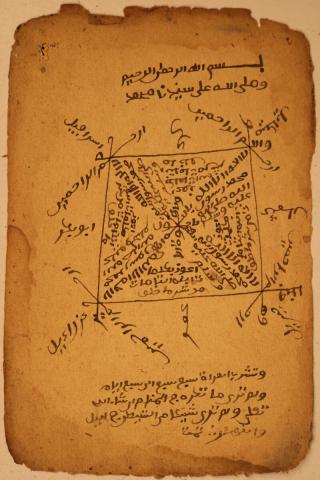Aims and objectives
The collections held at the National Archives of Nigeria at Enugu and Calabar, which date from the late 1800s to 1960, are invaluable for the history of European contact with Eastern Nigeria. The collections are known to include official British colonial government papers; papers of native and local authorities; papers of semi-public bodies and institutions; colonial court records; photographs, several petitions, and letters by local people during the colonial period; private and family papers, as well as those of ecclesiastical bodies.
These documents that deal with European contact with Eastern Nigeria are in danger due to deplorable, deteriorating conditions and the frequent use of photocopying of fragile papers. At the Calabar regional archive, thousands of pages of colonial documents and private papers are piled on the floor in a room without climate controls because the archive has no permanent home. These deteriorating conditions leave the records damp and prone to mold growth and termite infestation. The conditions at the Enugu archive are not much better. Without immediate efforts to preserve these materials, they may not last more than a few more years.
The materials located at these archives are significant for a number of reasons. Europe had a long history of economic and political relationship with the societies of Eastern Nigeria. The development of the slave trade in the fifteenth century created the initial economic link with European traders, particularly the British, until the abolition of the trade. Like many parts of Africa, Nigeria was incorporated into the British Empire as the drive for imperial possessions heated up toward the late nineteenth century. The documents at the Enugu and Calabar archives tell the story of this contact, the major players, and the impact on local peoples.
Also, the present day eastern part of Nigeria was perhaps the most important and unique in British West Africa. From the eighteenth century, Britain was the region's most important trading partner both in the era of the slave trade and in the post-abolition period, when the trade in palm oil and later kernel brought the region into closer economic contact with the British. Following European colonisation of Africa toward the end of the nineteenth century, the British entered into several treaties with local chiefs, which eventually gave Britain control of the region. British traders and missionaries provided other opportunities for greater intercourse between Europeans and local people. These papers present stark evidence of that contact. The surviving papers are a unique record of a wide range of African-European relations during the colonial era.
A three month pilot study will be undertaken to assess the feasibility and scale of effort required to preserve the endangered regional records held at The National Archives of Nigeria at Enugu and Calabar. In addition, the pilot study seeks to determine the existence of privately held manuscripts and other records related to the slave trade in the region.
Outcomes
This pilot project succeeded in developing a listing of the documents that exist at the two regional archives at Enugu and Calabar. The materials held at the National Archives of Nigeria at Enugu and Calabar, which date from the late 1800s to 1960, include official British colonial government papers; papers of native and local authorities; papers of semi-public bodies and institutions; colonial court records; photographs, several petitions and letters by local people during the colonial period. There are some private and family papers, as well as those of ecclesiastical bodies.
The Enugu Collection
The collection at National Archives Enugu is well organised. The materials date from the late 19 th century to the end of British colonialism in 1960. The holdings occupy about 3,000 linear feet of record shelves and include records of the defunct Eastern Region of Nigeria now divided into nine states, namely, Abia, Akwa Ibom, Anambra, Bayelsa, Cross River, Ebonyi, Enugu , Imo and Rivers States . Other materials held at Enugu include Consular Despatches, Records of the Protectorate Administrations; Records of the Civil Secretary, Enugu, Provincial and District Offices Records, Records of Local Governments and Native Administration, Records of the Judiciary and Ecclesiastical Records. There are also records of various Ministries and Parastatals. The estimated number of pages of these records is about 25 million± 1 / 2 a million.
The Calabar Collection
The Calabar Archives houses divisional records of the Calabar Province. Currently several thousand pages of these documents are in danger due to deteriorating conditions at the Calabar archives. Colonial documents and private papers are piled on the floor in a room without climate controls because the archive has no permanent home. These deteriorating conditions leave the records damp and prone to mold growth and termite infestation.
Some of the earliest records at Calabar date back to the late nineteenth century when Calabar was the capital of what became Nigeria. Some of these records have not been fully catalogued or listed.
Privately Held Papers
This part of the project was incorporated to identify historically important papers relating to the Atlantic slave trade in the Bight of Biafra. Approximately 15 people were interviewed about the existence of privately held manuscripts and other records of the slave trade in the region and the likelihood of gaining access to them. These were mainly in the Arochukwu and environs, the most important middlemen traders during the slave trade in the Bight of Biafra.
Overall, materials of significant historical importance could not be identified in a quantity that would warrant the pursuit of this portion of the project. Most people are not in the habit of preserving such private papers or of donating family papers to the archives. Materials relating to slavery for the region are available as official documents at the archives.
Assessment of Labour and Equipment
A preliminary assessment was made of what would be required in terms of equipment and labour to carry out the task of digitising prioritised collections at both archives. Sample digital images were created.
The records copied by this project have been catalogued as:




